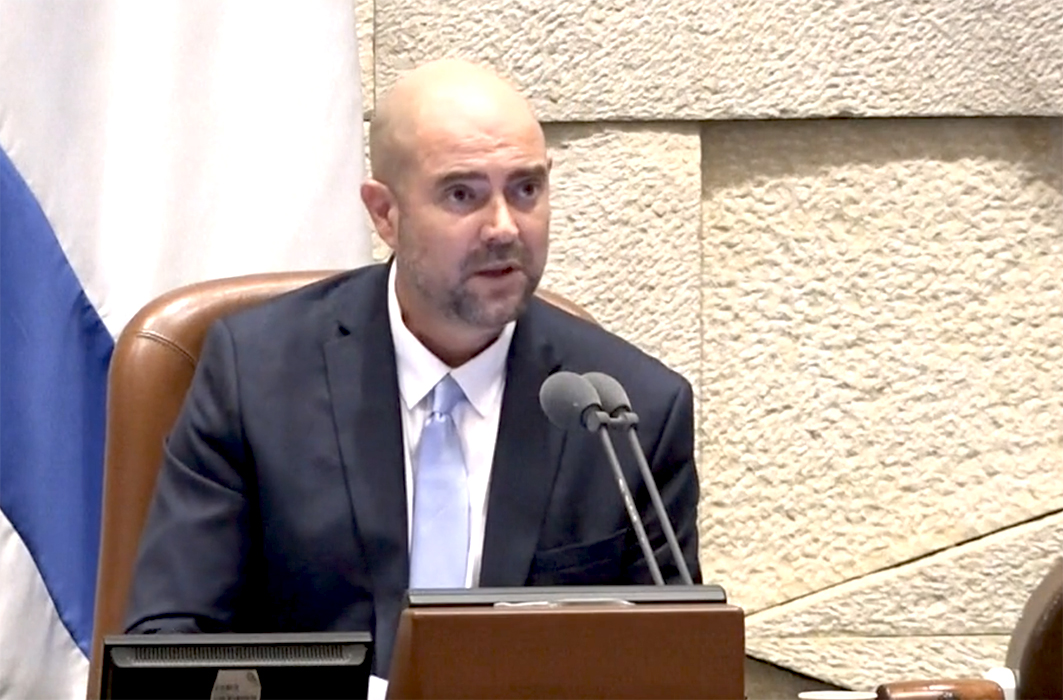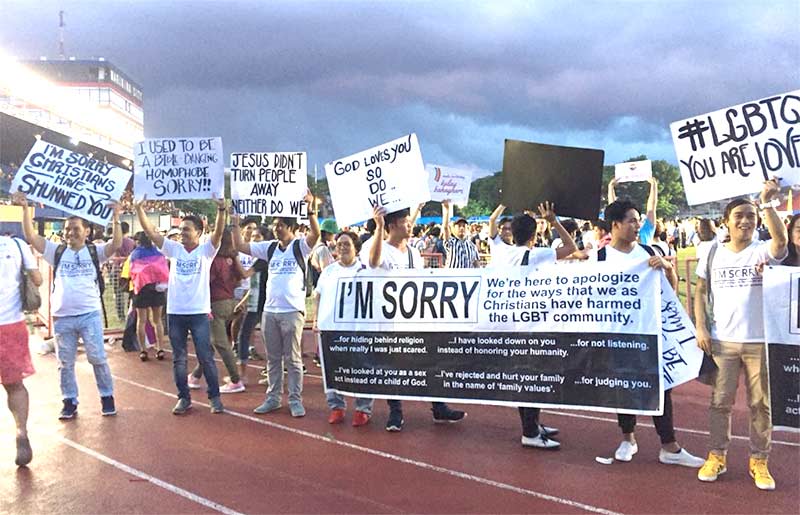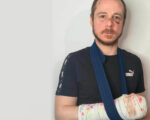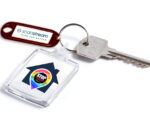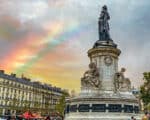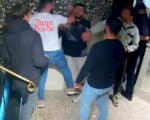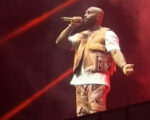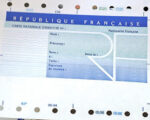>> 25,000 attend Jerusalem pride parade under heavy security
[spacer]
Quelque 25.000 personnes se sont réunies ce jeudi dans le centre de Jérusalem pour la quinzième édition de la Pride, encadrée cette année par un impressionnant dispositif policier. Une participation record, soulignent les médias israéliens, alors que les déclarations homophobes de certains rabbins ont contribué à faire monter les tensions ces dernières semaines.
Multipliant les contrôles, la police affirme également avoir déjoué des projets d’agression, notamment de la part du frère du juif ultra-orthodoxe qui avait poignardé Shira Banki, une adolescente de 16 ans, et blessé cinq participants l’an dernier. Condamné à la prison à vie pour ce meurtre, l’homme aurait contacté son frère Michael pour lui insuffler la consigne d’attaquer à son tour les participants. Ce dernier a été arrêté et sa détention a été prolongée jusqu’à vendredi.
Rappelons que le meurtre de Shira Banki survenue le 30 juillet 2015 avait déclenché une polémique sur l’inefficacité du dispositif de sécurité. Pour éviter tout nouveau drame, la police a pris des mesures drastiques et mobilisé plus de 2000 agents pour l’occasion.
Lors du défilé, 30 autres « suspects » qui projetaient également de perturber le déroulement du rassemblement ont été arrêtés, en possession de couteaux notamment pour certains. Mais malgré les craintes, la parade s’est déroulée dans le calme au milieu d’une forêt de drapeaux arc-en-ciel.
Sur place, le ministre de la Sécurité intérieure Gilad Erdan, membre du Likoud, le parti du chef du gouvernement Benjamin Netanyahu, a affirmé à l’AFP qu’il s’agissait « d’une marche de la tolérance pour exprimer notre solidarité ». Le chef de l’opposition travailliste Isaac Herzog était aussi présent et Benjamin Netanyahu a rappelé dans une vidéo diffusée sur les réseaux sociaux que le « principe de l’égalité est la raison pour laquelle Shira Banki a défilé l’an dernier et c’est pourquoi des milliers d’entre vous marchent aujourd’hui » : « Elle a été assassinée par un extrémiste plein de haine. Malheureusement certains membres de notre société ne sont toujours pas prêts à accepter la communauté LGBT », a-t-il déploré.
A Jérusalem, une ville sainte pour les juifs, les musulmans et les chrétiens, la communauté LGBT a plus de mal à être acceptée qu’à Tel-Aviv, plus tolérante et festive. Au début de la marche, un « mariage » symbolique entre deux hommes a tout de même eu lieu. Chacun d’eux a cassé un verre avec son pied comme le prescrit la tradition juive lors des cérémonies de mariage pour remémorer la destruction du Temple de Jérusalem.
Quelques juifs ultra-orthodoxes reconnaissables à leur kippa noire ont également participé à la procession. L’un d’eux, qui a requis l’anonymat a expliqué qu’il entendait prouver que « Shlissel ne représente pas le judaïsme ultra-orthodoxe pour qui l’amour du prochain constitue le devoir fondamental ». Une femme religieuse de 27 ans, Ariela Matar, a expliqué pour sa part qu’elle souhaitait dénoncer les « propos hideux », proférés notamment par le colonel Eyal Karim, candidat désigné pour le poste de grand rabbin de l’armée, qui a ainsi suggéré que les homosexuels se fassent soigner car ils sont « malades et handicapés ». Ou encore de Yigal Levinstein, banni des bases de l’armée, où il donnait des conférences, pour avoir qualifié les LGBT de « pervers ». Mais 300 rabbins ont exprimé leur solidarité avec lui.
[spacer]
>> Some 25,000 people were marching at the fifteenth annual Jerusalem gay pride parade under heavy security Thursday evening, according to police estimates, a year after a religious extremist knifed a teenager to death and wounded six others at 2015’s march.
Officers arrested 30 people suspected of trying to disrupt the event, an Israel Police spokeswoman said. Two of them were in possession of knives, Luba Samri said in a statement. « The police will continue to use a firm hand and show zero tolerance toward anyone who tries to disrupt the parade in any way, » she added.
Jerusalem police chief Yoram Halevi said earlier in a briefing to reporters, « There was a serious threat to those participating [in the Jerusalem pride parade]. »
Parade-goers began congregating at Liberty Bell Park from 4:15 p.m., with the march beginning at 5:45, heading up Keren Hayesod and King George streets. The march was set to conclude downtown, at Independence Park, later in the evening.
Much of downtown Jerusalem was closed off to vehicular traffic on Thursday afternoon, and, amid the heightened security, even pedestrians complained that police prevented them from crossing some streets.
A Times of Israel reporter saw only one entrance to the parade, where attendees were assembled to undergo two security checks. A second entrance was subsequently opened. Police set up barriers to line long sections of the march and in some areas held back passersby. The hermetic security precautions forced irritated pedestrians to make looping detours as they were directed by police from one barricade to another in order to reach their destinations.
Lourdes Santos, who was returning from lunch downtown with her daughter, needed to get to the Inbal Hotel where a private bus was waiting to take her and others to a bar mitzvah. However, police officers and steel barriers stopped her short little more than 50 meters from the hotel, which abuts Liberty Bell Park.
« We are a bit angry, » she said as she tried to navigate her way around the outskirts of the park and approach the hotel from the other side.
Organizers asked participants to bring flowers to place at the site on Keren Hayesod Street where 16-year-old Shira Banki was killed by Yishai Schlissel, who is serving a life sentence for her murder.
Earlier in the day, police said that Schlissel was arrested in prison and accused of plotting together with his brother Michael Schlissel to carry out an attack at this year’s event.
Jerusalem Mayor Nir Barkat, who announced earlier in the week that he would not attend the event in order not to offend religious residents of his city, said Thursday that he understands the resentment some felt over his decision, and called for the day to be seen as a tribute to freedom of expression and against incitement.
Hours before the main event, Barkat joined Jerusalem Police commander Halevi at a memorial to Banki, who was stabbed to death at last year’s pride event, and laid a flower at the site, which is along the planned route of the march later in the day.
« I understand the pain and the criticism of those who don’t agree with my decision not to participate in the parade, » he said. « I chose a different way to honor the memory of Shira Banki, a sweet young girl who was murdered because of hatred. »
« I wish, with all my heart, that on this day we will know how to all unite against any show of incitement, violence, and for the right to freedom of expression of every person and community in Israel, regardless of religion, race, or gender, » he said.
Barkat on Wednesday told the Yedioth Ahronoth daily that while he supported the LGBT community’s freedom of expression, he could not participate.
« It is their right to march, » he told the popular tabloid. « The city of Jerusalem, myself and the police will do everything possible to allow them to enjoy that right. But they must know that it offends others. Tolerance means not only permitting people to march but also to find the way for them to do so without hurting the sensibilities or the feelings of others. »
The comments set off an immediate firestorm, with at least one politician accusing Barkat of siding with Yishai Schlissel. Schlissel’s attack at the pride parade came just weeks after the ultra-Orthodox extremist was let out of prison, where he had served a 10-year sentence for a similar — albeit nonfatal — attack at the 2005 pride parade in which he stabbed three people.
Police announced Tuesday they would beef up security around the annual march through central Jerusalem and perform security checks on all participants, measures intended to prevent a recurrence of the violence that marred 2015’s parade. In all, some 2,000 officers were on hand Thursday to secure the march.
Noam Eyal, a 31-year-old Jerusalem resident who works with the nonprofit Movement for Quality Government in Israel, was stabbed in the upper back at the parade last year. He said he did not know Banki but was walking next to her during the attack.
« It was deep but it missed all the important stuff, no vital organs, » he told The Times of Israel. « We didn’t know how severe it was until I was in the ambulance because it was very deep. »
He has been heavily involved in the LGBT community since, attending nearly every pride parade in Israel, and helped organize this year’s Jerusalem event.



